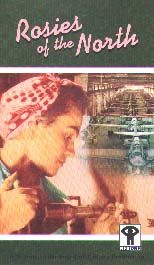|
________________
CM . . . .
Volume VI Number 17 . . . . April 28, 2000
Rosies of the North is a war story, but it is much more that just a war story. It reveals the
attitudes of women at the beginning of World War II, as well as the attitudes of employers. In
1940, Canadian Car and Foundry hired 200 women to build Hawker Hurricane fighter planes for
combat in the Battle of Britain. Just a year later, 3000 additional workers, 40 per cent of them
women, were employed, turning out 1400 Hurricanes altogether. When these planes were phased
out at the end of the Battle of Britain in 1942, Canadian Car switched to building Curtiss Dive
Bombers for the United States. Excellent footage is shown of the interior of the factory and also
of the surrounding area of what was Fort William and is now Thunder Bay.
Some of the intriguing facts pointed up in the video were that new girls learned faster from the
women instructors than from men instructors because the women teachers had far more patience
than men had. As might be expected in those days, the pay rate was vastly different for women
than for men doing the same work. Women were steadier welders and missed less time at work
than men. Married women were not allowed to work, but some of them kept their marriages
secret and worked anyway. Matrons (nurses) were hired to keep female employees in line, but
there were no parallel overseers for males. Air and noise pollution was rampant in the factories,
but the workers adjusted to it. The Chief Engineer at Canadian Car and Foundry was Canada's
first ever female engineer, Elsie MacGill. Her degree was in aeronautical engineering, and she was
the first woman in the world to design an airplane.
In the film, Rosies, now senior citizens, were interviewed about their experiences and asked also
for their opinions of Elsie MacGill. Many thought she was too conscious of her accomplishments
and looked down on the women who worked on the floor. She was sometimes called a "Spitfire,
Queen of the Hurricanes." But other women with a more charitable view allowed that she
completely changed life for women economically and legally, and her later appointment to the
Royal Commission on the Status of Women was a fitting one.
Towards the end of the war, 3600 people were laid off at the Canadian Car plant, but the Rosies
who contributed their memories for this film concluded that their work at the foundry was the
greatest experience of their lives.
Highly recommended viewing, illustrating an important side of life in Canada during the Second
World War, the video has closed captioning, a bonus for hard-of-hearing seniors who will
appreciate the nostalgia in the film.
Highly Recommended.
Joan Payzant is a former teacher and school librarian in Dartmouth, NS.
To comment on this title or this review, send mail to cm@umanitoba.ca.
Copyright © the Manitoba Library Association.
Reproduction for personal use is permitted only if this copyright notice
is maintained. Any other reproduction is prohibited without
permission.
Published by
TABLE OF CONTENTS FOR THIS ISSUE - April 28, 2000.
AUTHORS |
TITLES |
MEDIA REVIEWS |
PROFILES |
BACK ISSUES |
SEARCH |
CMARCHIVE |
HOME
|
